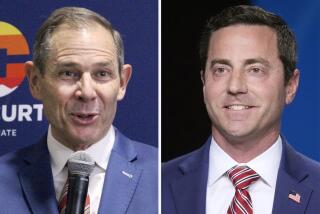GOP vs. GOP: Key primary races in Georgia, Kentucky, Idaho and Oregon

- Share via
Reporting from Washington — Tuesday marks the biggest day of primary elections so far this year, with voters in six states casting ballots in state and congressional elections that will offer another test of Republican establishment efforts to curtail the influence of outside tea-party-inspired groups.
Here are some key races where Tuesday’s outcome will help shape the midterm battle for Congress this fall.
1. Will Palin-backed Handel surge into a runoff in Georgia?
In Georgia, a hard-fought GOP primary for an open Senate seat promises to be a cliffhanger.
Republican leaders are pleased that the most conservative candidates in the wide-open field, Paul Broun and Phil Gingrey, appear to be trailing after early enthusiasm for their campaigns shifted. Party elders were aiming for a more measured candidate for what is expected to be a costly general election battle against the Democratic front-runner, Michelle Nunn, the daughter of still-popular former Sen. Sam Nunn.
With no GOP candidate expected to clear the 50% threshold to win, Tuesday’s primary becomes a race for a spot in a July runoff.
David Perdue, a millionaire former business executive, appears to be leading what has become a three-way contest for the two runoff spots. His challengers made an issue late in the race of his telling a local newspaper that righting the nation’s finances would take both spending cuts and revenue increases – the latter seen as code for new taxes. Perdue’s camp denies he was advocating raising taxes.
Karen Handel is trying to make a come-from-behind surge with a who’s who of conservative backers, including Sarah Palin, as she and Jack Kingston, a Savannah-area congressman, try to gain ground.
Nunn faces an uphill fight in November to win the seat, which became open with the retirement of Republican Sen. Saxby Chambliss. But the changing demographics of metro Atlanta give Democrats their best chance to play offense this fall.
2. How big a win does Mitch McConnell score in Kentucky?
McConnell, the Senate’s Republican leader, appears on track to easily fend off the challenge from his right by Matt Bevin, a businessman who claimed the tea-party mantle. Bevin had hoped to tap into broad distrust that conservative activists nationally feel toward McConnell, a key dealmaker in the Capitol for years and potentially the next Senate majority leader if Republicans win back control of the chamber this fall.
But McConnell, an astute political strategist, made moves early on to help ensure he could withstand any potential conservative challenge. He saw firsthand the tea party at its strongest in the 2010 campaign, when Rand Paul won election to Kentucky’s other U.S. Senate seat, easily defeating then-Secretary of State Trey Grayson, who had endorsements from McConnell, former Vice President Dick Cheney and a full roster of state officials. This time McConnell made sure to secure an endorsement from Paul.
McConnell worked aggressively to highlight aspects of Bevin’s business career that put him in conflict with the tea-party orthodoxy, including a state grant that a Bevin-owned business secured after a fire destroyed a Connecticut factory. McConnell’s campaign dubbed his rival “Bailout Bevin.”
Of late, McConnell has turned his attention to what promises to be a bruising fight against Alison Lundergan Grimes, Kentucky’s Democratic secretary of state. In recent stops through Kentucky, McConnell has focused on the damage he says Obama administration policies have had on the state economy, particularly the coal industry. He’s also trumpeted the role he could play as majority leader in helping to begin to roll back those policies.
Two recent polls show McConnell heading toward a 20-plus-point victory in the primary. Such a show of strength would give him fresh momentum heading into the general election fight against Grimes and her argument that Kentucky needs a new voice in Washington. McConnell’s personal approval ratings are low, about on par with Obama’s, according to the latest Bluegrass Poll from the Louisville Courier-Journal.
Though it’s turned a darker shade of red in federal elections, Kentucky actually still has more registered Democrats than Republicans on its voter rolls. Grimes was part of a near-clean sweep of statewide offices in the 2011 elections. The fall campaign will be a test of how strong anti-Obama sentiment in the state is. It will be an expensive test, given how both campaigns are raising money.
3. Does Mike Simpson beat the Club?
The Club for Growth, one of the more potent small-government, anti-tax advocacy groups in the nation, held a “Primary My Congressman” campaign last year to seek activists’ input in determining which Republican lawmakers to defeat in the midterm year. The first target to emerge was Idaho Rep. Mike Simpson, an eight-term incumbent, ally of Speaker John A. Boehner (R-Ohio) and senior member of the Appropriations Committee.
The Club put its stamp of approval on challenger Bryan Smith, as did nearly the full roster of conservative and tea-party-aligned groups. But major establishment forces like the U.S. Chamber of Commerce came to Simpson’s defense. The chamber has sponsored ads featuring 2012 Republican presidential nominee Mitt Romney offering his enthusiastic endorsement of Simpson.
That ad, in particular, was seen as giving Simpson a critical boost in the state’s second district, which includes a significant Mormon population. And the Club for Growth, which had been spending on television ads to boost Smith, has not been on the air in the closing weeks of the race.
Rep. Raul Labrador, Idaho’s other congressman and a frequent thorn in the side of House GOP leadership, recently downplayed the notion that the tea party was losing this year. “Incumbents win elections,” he said at a recent luncheon of House conservatives.
4. Can Republicans expand the map in Oregon?
Oregon Sen. Jeff Merkley was one of eight Democrats to enter the Senate after 2008 victories boosted by Obama’s historic first presidential election. While others in that group have drawn marquee challengers, the class of Republicans seeking to challenge Merkley was slow to develop.
But from a crowded field, national Republicans have singled out Monica Wehby, a pediatric neurosurgeon, as the candidate with the most potential to give Merkley a tough race. McConnell just this week singled Wehby out as one of the GOP’s star candidates, sharing with supporters her slogan that voters could “replace your senator, not your doctor.” It’s a potentially strong line of attack in a state that has struggled with the rollout of its health insurance exchange.
Wehby first attracted national attention for this television ad featuring a former patient of hers explaining how Wehby came forward to help deliver her child, who had a congenital disorder, when other doctors were advising her to terminate the pregnancy.
But of late, Wehby has drawn negative attention based on reports recently made public of harassment allegations against Wehby by her then husband and by a former boyfriend. Because Oregon conducts all of its elections by mail, it’s unclear whether the late reports will have much impact on the race, in which Wehby appeared to be breaking from the crowded field.
Democrats are already painting Wehby as a “flawed candidate,” though without referencing the past harassment allegations. In a memo released Tuesday morning, Merkley’s campaign manager said both Wehby and state Rep. Jason Conger, another leading GOP hopeful, were “out of touch with Oregon values” and would “support a national Republican agenda that would hurt Oregon.”
More to Read
Sign up for Essential California
The most important California stories and recommendations in your inbox every morning.
You may occasionally receive promotional content from the Los Angeles Times.












